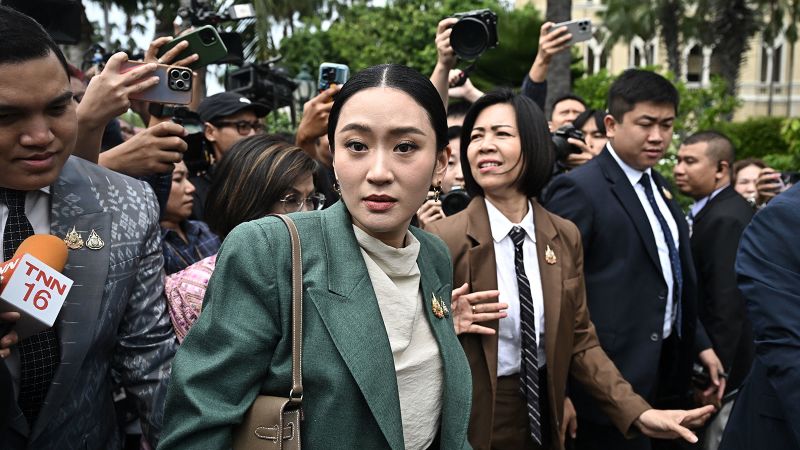Court Dismisses Prime Minister
Thailand’s Constitutional Court has dismissed Prime Minister Paetongtarn Shinawatra from office, ruling that she placed personal ties above national interests. The court’s decision follows the leak of a sensitive phone call that sparked questions about her loyalty during a regional dispute.
In its judgment, the court stated that Paetongtarn’s actions undermined public trust and violated the ethical standards expected of a national leader. The ruling also dissolved her entire cabinet, leaving the government in transition during a politically fragile period.
The Leaked Conversation
The controversy centers on a call in June between Paetongtarn and Hun Sen, the former Prime Minister of Cambodia. At the time, Thailand and Cambodia were engaged in a tense border dispute.
In the recording, Paetongtarn appeared to endorse Hun Sen’s stance while addressing him warmly as “uncle.” For the judges, this was evidence of favoritism toward a rival nation during a sensitive national security matter.
“The prime minister’s endorsement of a foreign leader’s position in a dispute with Thailand cannot be justified,” the court said. It labeled her conduct a “serious breach of moral and constitutional duties.”
Cabinet Dissolved, Interim Leadership Installed
The ruling not only removes Paetongtarn from her role but also dissolves her cabinet in its entirety. This leaves a power vacuum in Bangkok at a time when stability is vital for the country’s economy and diplomacy.
In response, the government announced that the deputy prime minister will act as interim head of government until parliament selects a new leader. No timeline for the vote has yet been set, but political observers expect an intense struggle as rival parties maneuver for power.
Blow to the Shinawatra Political Dynasty
Analysts describe the verdict as another major setback for the Shinawatra family, one of the most influential yet embattled dynasties in Thai politics. Since the early 2000s, members of the family have repeatedly clashed with Thailand’s powerful military and judiciary.
Paetongtarn, daughter of former prime minister Thaksin Shinawatra, is now the sixth family member forced out of office through either coups or court rulings. Both Thaksin and his sister Yingluck Shinawatra were previously ousted under similar circumstances.
For supporters, this latest decision reflects a continuing pattern of establishment resistance against populist leaders. Critics, however, argue that the Shinawatras have long blurred the line between personal loyalty and national interest.
A History of Political Turmoil
Thailand has experienced frequent political instability over the past two decades. Since 2006, the country has seen multiple military coups, dissolutions of parliament, and court-ordered removals of prime ministers.
The military retains significant influence, and the judiciary often plays a decisive role in political disputes. While Thailand formally restored civilian rule in 2019, critics say the balance of power remains heavily tilted against elected leaders.
Observers note that the latest ruling risks further polarizing society. Supporters of the Shinawatra family are concentrated in rural areas, while Bangkok’s elites and military establishment have long opposed them.
Regional and International Implications
The controversy also has regional dimensions. Relations between Thailand and Cambodia have often been strained over historical and territorial disputes, particularly around the Preah Vihear temple area.
A Thai prime minister openly aligning with Cambodia’s position during a border standoff raised alarms within Bangkok’s security establishment. The court emphasized that the prime minister’s role requires prioritizing national sovereignty above personal or political alliances.
What Comes Next
For now, Thailand faces an uncertain path. The deputy prime minister will steer the government until parliament convenes to elect a successor. The process could take weeks, and there is speculation that the military may seek to influence the outcome behind the scenes.
Political analysts warn that if Paetongtarn’s supporters perceive the ruling as unjust, protests could re-emerge. Thailand has witnessed mass demonstrations in the past whenever popular leaders from the Shinawatra camp were removed.
Conclusion
The dismissal of Paetongtarn Shinawatra marks a turning point in Thailand’s turbulent political journey. The case highlights the ongoing tension between elected governments, the judiciary, and the military establishment.
As the country prepares for a new prime minister, the ruling raises pressing questions about democratic stability and the enduring influence of powerful institutions over Thailand’s political future.















